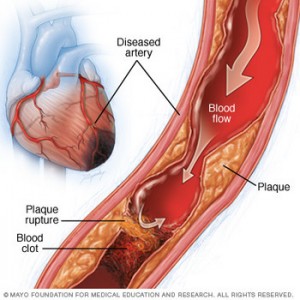The fact that the topic of diet and brain health keeps popping up in the medical literature, is significant. This year has not been any exception.
The Mediterranean diet in particular has been shown to have very positive effects on postponing Alzheimer’s disease by as much as 5 years.
A clinical study on 674 elderly patients (mean age 80.1 years) without dementia, was published in the journal “Neurology”. It examined the question whether adherence to the Mediterranean diet would affect the degree of brain atrophy. Researchers already knew that Alzheimer’s disease was less common on a Mediterranean diet.
The findings were interesting: a high adherence to the Mediterranean diet led to a higher total brain volume, total grey matter volume and total white matter volume as measured with high-resolution structural MRI scans.
Quality of diet influences cortical thickness of brain
Lower meat intake led to higher brain volume. In addition, more fish intake also caused the mean cortical thickness of the brain to increase. Parts of the brain in Alzheimer’s patients showed atrophy like in the cingulate cortex, parietal lobe, temporal lobe, and hippocampus with good volumes on MRI scans when patients adhered to the Mediterranean diet. These volumes started to shrink when the diet was poor.
Those patients adhering to a Mediterranean diet have brains that on MRI scan look 5 years younger and are much less likely to develop Alzheimer’s disease. Physicians have known for a long time that people, who eat a healthy diet, exercise regularly, don’t smoke and who keep mentally stimulated will generally have healthier brains than people who don’t do these things.
What is the Mediterranean diet?
It involves eating meals derived from plants: vegetables, fruit, cereals, beans and nuts. You can eat fish and poultry twice per week. You cut down the amount of meat and dairy you eat, but you can have a glass of wine per day. Instead of butter olive oil is used instead. Here is more information of what is included in the Mediterranean diet.
Because there is less fat and less high glycemic index carbs in this diet, it is also a diet that lends itself for weight management. You shed a few pounds and reach your ideal body mass index without paying much attention to it.
Apart from the Mediterranean diet the MIND diet has also been shown to prevent brain atrophy. This diet is a combination of the DASH, which physicians developed for controlling high blood pressure, and the Mediterranean diet.
The Mediterranean diet makes you live longer
The Nurses’ Health Study that has been going on since 1976 showed that telomeres, the caps on chromosomes, were getting shorter in nurses who lived on junk foods, but surprisingly nurses on the Mediterranean diet preserved their telomeres. Longer telomeres have an association with slower aging. And people with longer telomeres reach an older age without diseases like heart attacks, liver disease or cancer.
Exercise on top of the Mediterranean diet
In addition to relying on a healthy diet, like the Mediterranean diet, for your health, think about doing regular exercises. These two ingredients together will prevent heart attacks, strokes and other diseases. When you combine exercise with a healthy diet your abdominal girth shrinks as this study showed.
Another study showed that when a Mediterranean type diet is combined with regular exercise, adult onset diabetes occurrence could be reduced by 28-59%.
This is quite a significant effect of two simple interventions: a healthy diet and regular exercise.
Don’t smoke
It does not make sense to go on a healthy diet, exercise and then smoke! Interestingly an Iranian study showed that when people became health conscious, adopted a healthy diet and exercised, they also started to quit smoking. People who did all of this, quit smoking, eating healthy and exercising regularly, were also the happiest and most content.
Exercise your brain
The evidence shows that any stimulation of brain activity, particularly anything that requires active and abstract thinking will protect the brain from developing Alzheimer’s disease.
Another study showed that prevention of Alzheimer’s disease is achieved by quitting smoking, treating high blood pressure, stimulating the brain and treating diabetes.
Conclusion
us. This approach will be the most successful way to prevent Alzheimer’s disease. It starts with quitting smoking. It goes on to starting a Mediterranean diet and staying on it. Regular exercise will take care of preventing heart attacks and strokes. But exercise also ensures that all of your brain cells continue to get oxygen and nutrients. This in turn prevents brain shrinkage.
Weight loss included in Mediterranean diet
The Mediterranean diet has a lower calorie content than the Standard American diet, there will be weight loss. The weight loss will continue until you reach your ideal body mass index. You can stimulate your brain by actively doing computer work, doing puzzles, playing a music instrument and phoning friends. In addition you may want to read reading books etc.. All this will contribute to preventing Alzheimer’s. Watching TV or movies is not an active mental activity. This is passive thinking, which means it is not as valuable as the other activities. Pick a hobby that enhances your life, and your brain will thank you for it too!







